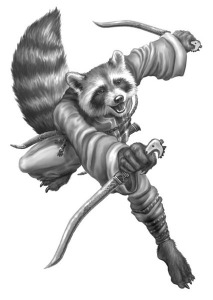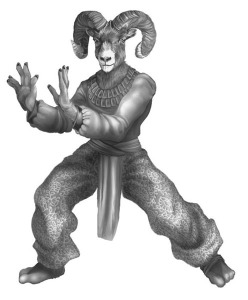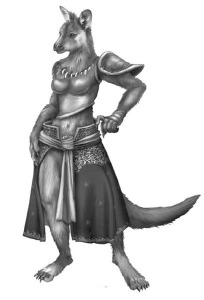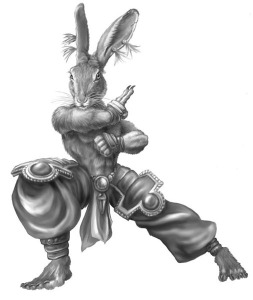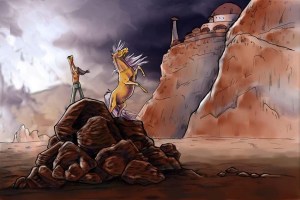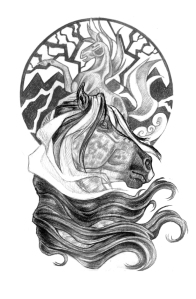Chapter 1: The Nest
The wind through the ancient sequoias reeked of smoke.
The titanic trees cast enormous bands of deep purple shadow, half-cloaked in dead, brown needles. Dawn seeped along the red-gold of their bark. Curls of fern withered by merciless heat sheltered in the shadows, waiting, still and parched, for the long overdue rainy season.
Amid the light, a shadow darted. Palm leaves rattled at its passing.
An adult male raptor ran swift and silent through the trees.
He was a giant. From the tip of his narrow snout to the tip of his tail, he was the largest of his kind. His scales broke into small, feathery hairs, covering him in a brilliant coat of metallic bronze. The short protofeathers grew longer on his forelimbs, covering his three-fingered paws in a mantle shaped like wings.
The sight of such an impressive animal sent the tiny mammals of the forest scurrying for their holes. This was the time of his kind, and this was the home of his clan.
The great male dipped under the archway of a sequoia root, crossed a fall of tangled branches with breathtaking agility, and sprang high onto a fallen log in the middle of a clearing.
He scanned the trees for a moment before lifting a leg to nip at his heel. The inside of each hind foot carried a sickle-shaped retractable claw.
Sighing breezes crackled a mass of brown cycads, cutting the sing of insects into silence. The male stopped, the crest of feathers at the back of his head hackling in alarm. The air felt thick, hazy with the drought, and he tasted ash. But there was no rising plume, no flame that he could see.
He clapped his jaws in uncertainty, berating himself. A wiser hunter would not flinch from strange sounds and smells. A stronger warrior would not cower from them like a hatchling.
But he was only Lightstep of the Tahrap clan.
In the morning raiment, he spread his forepaws and lifted his head.
“Sol,” he whispered. “Mother of Time. Give us strength.”
Sol hung above him, a blinding, radiant disc in a cloudless blue sky. Lightstep felt Her warmth and lifted his head to Her.
“Tell us what we must do, Goddess. My newborn chicks hunger, my mate frets. We need rain, Goddess. Whatever you ask of me in return, I will give it for the sake of my clan.”
They were honest words, but Lightstep was still afraid. Sol was as brutal as She was kind.
Ferns shifted, and Lightstep turned his head at the arrival of another clan member.
A young juvenile stumbled out of the trees, tripping over a broken branch. His half-grown crest began at his snout, a moptop of gold with a stray sliver of green. “Ow! Lightstep! I want to go back now!”
Lightstep glowered at Greenfeather. He hadn’t expected to gain a lazy juvenile and the responsibility of training him when he’d won his mate in a dance. Greenfeather fancied himself the brother of the clan’s Crested, and therefore free of any obligation to honor or law. And though Lightstep’s authority over other males was absolute, and Brightquill could never interfere, killing Greenfeather would disappoint his mate.
Greenfeather shook dead needles from his coat. “I’m thirsty.”
Lightstep closed his eyes again, resuming the warrior’s stance of prayer: forepaws folded at his sides, head bowed, tail up. He ignored Greenfeather’s fidgeting.
“Lightstep?”
Lightstep sighed without opening his eyes. “What, Greenfeather?”
“Can we go back now?”
“Our Crested sent us here to search this forest for danger.”
“Yes, well, I’ve done that. Can we go back?”
“A good warrior praises Sol.”
Greenfeather sighed. “Yes, I’ve done that, too. I’m thirsty.”
Lightstep ended his prayer and sprang off the fallen log. “The territory markers need to be refreshed.”
Greenfeather brightened at that, and trotted along behind Lightstep towards the edge of clan ground. Lightstep watched him bungling along behind, and hoped he could teach him something of Sol’s law that would stick in his empty, fool skull.
At the edge of the trees, Lightstep sniffed the strange, heavy air.
“This is how a warrior leaves his mark,” Lightstep said.
Near a young tree, Lightstep reared up, drawing his claws down the trunk. He ripped deep, leaving scores that bled sap. He thrilled at the splintering cracks, rubbing the glands beneath his jaw on the scratchy bark.
“In the name of Sol, I mark this ground for the clan of Tahrap.”
He stepped back, and at his nod, Greenfeather ran to find another tree.
Lightstep folded his long forelimbs and grasping claws against his sides, the palm of each forepaw facing each other. He combed the soft, furry protofeathers, trying to convince himself that nits nibbled beneath his skin and not trepidation.
He moved on to rake the ground with his hindpaws and squatted to leave his dung mark.
When he finished, he saw Greenfeather from the corner of his eye. The young hunter had found a tree, and was reaching as high as he could to score it.
Higher than Lightstep’s marks.
Lightstep executed a spectacular leap out of the ferns. He twisted and nearly landed on top of Greenfeather, who fell over himself trying to get out of the way. Lightstep flipped Greenfeather and pinned him with one hook-clawed foot.
“You think this is how droemar behave?” Lightstep hissed, using the name for their own kind, the running hunters. “You’re too cowardly to flaunt disrespect at your sister, so you’ll try it with me?”
“No, no!” Greenfeather cringed. “I just … I wanted to see what it felt like!”
Lightstep seethed. “You are not Crested! The clan does not even recognize you as warrior!”
“You don’t recognize me as warrior!” Greenfeather said.
Lightstep hissed. “That is because you know nothing of what it means to be droemar! How dare you try taking the honor without being worthy of it? If you ever flout clan law like that again, I’ll kill you, Greenfeather. ”
“All right! All right, Lightstep.” Greenfeather flinched, peeking at him sideways with a sulk in his voice.
Lightstep sighed, releasing Greenfeather. “Don’t even bother marking.”
Greenfeather’s jaws fell open in outrage. He picked himself up in silence.
Lightstep headed back towards the nest. He wanted to ignore his fear, ignore Greenfeather’s bitterness, and curl up beside his mate and eggs. But he couldn’t. How could he call himself worthy of Sol’s light if he did?
He stopped in the forest and looked back.
Greenfeather swatted at flies and blundered into a low-hanging branch.
“Greenfeather. Come here.”
The young droemar approached, his crest alert and wary.
“Listen.” Lightstep closed his eyes.
Around the valley, in the distance, far off hoots and moans sounded from the herds that Lightstep’s clan hunted and honored.
“What is it?” Greenfeather said.
“Those are the children of Sol. Creatures of honor that keep Her law and know Her name. Like us.”
Greenfeather sighed. “So?”
“When we walk with Sol, it is not an easy thing, Greenfeather. But the burden of honor is worth carrying, when all of Her children respect and celebrate you as their warrior.”
Greenfeather stood at Lightstep’s shoulder, and he thought he saw the young droemar’s eyes soften.
A shriek tore through the forest.
It raised every feather on Lightstep’s back.
It shook the dying needles from the trees, a scream of unspeakable agony and terrible loss. A cry that begged for mercy from something too horrible to be endured any longer.
“What is that?” Greenfeather cried.
“Come!” Lightstep leaped into the undergrowth.
Dried ferns, desiccated bundles of fan-shaped gingko, and shriveled vines carpeted the ground. He found a path cutting through them and sped up, ignoring the ferns slapping his muzzle. The wrenching, strangled cry turned the iron of his courage to rust. As he raced towards it, a terrible stink rose. Thick, rotten, and oozing corruption.
Headed towards the nest.
Heart in his throat, Lightstep ran faster. Nothing must get past him, for the sake of his mate and eggs.
He spotted a dark shape through the leaves. A crunch, then the sound of a heavy body falling and rolling downhill. With a final crunch of dead bracken, everything went still.
Terror seized Lightstep’s limbs and he skidded to a halt.
“It’s a monster!” Greenfeather caught up to him. “It’s a monster, Lightstep, let’s go back—“
His voice drowned out as the thing screamed and screamed.
“We stand firm against things unnatural to Sol!” Lightstep barked in Greenfeather’s ear. “We kill anything that threatens the clan!”
But he forced himself to take those last few steps.
The undergrowth dropped away into a clearing.
Below him lay a grazer. A small head narrowed into a wide, heavy beak meant for stripping ferns. Its neck swept into sharp shoulders and a fat, stiff tail.
Its hide blistered on its shoulders, and burst into a ruin of blackened flesh. It sagged on its belly, tongue lolling, and the terrible smoke-stench rolled off of it in waves. Flies feasted on the awful wounds in clouds, worms rolling in pockets of flesh.
“Sol’s light,” Greenfeather swore behind Lightstep.
Lightstep gaped. To treat a fellow creature in such a way was anathema. A child of Sol was entitled to the protections of Her laws.
“Let’s run away, Lightstep,” Greenfeather said. “It’s cursed!”
The grazer’s eyes rolled in their sockets, and amazingly, it screamed the deafening bellow again.
“Cease! Cease, brother!” Lightstep cried, unable to bear the sound. “We are here.” He took a few tentative steps down the slope and felt his stomach roll at the stench. “I am Lightstep, warrior of the Tahrap—”
“End me,” the grazer rasped. It choked, and a few wriggling worms fell from its beak. “I have renounced Sol.”
Lightstep froze and hissed. “We are not bound by honor to end your suffering if you are a lawbreaker! We will leave you here for the flies!”
“I was forced,” the grazer wheezed, “to curse Her. Please. I renounced Her in the most terrible ways. The only way back is … through a warrior of Sol.” It coughed again, spewing worms across the ground. “Please … Kill me with your sacred claw and then run, droemar.”
“Who did this?” Lightstep came closer. “Who forced you?”
“She ordered it. She’s coming. You must end me and then run, run as far and fast as you can. The fire in her breath,” the grazer said. “Burned me.”
“Whose fire?”
“For pity’s sake, droemar.”
“Yes, I shall!” Among droemar, the killing claw was sacred. A killing claw’s promise was death, for no droemar sheathed their claw without blood upon it. Lightstep placed the tip of it on the grazer’s neck. “Just tell me who did this to you! I will seek justice for you!”
“You cannot seek justice,” the grazer stared up, blinded by pain, “from a child of the Dragon Kings.”
Lightstep stared at him. The Dragon Kings were the firstborn of Sol, creatures in stories that had risen up against Her and tried to destroy Her. It made no sense.
“The war against Sol is rising,” the grazer cried.
“Shut up!” Greenfeather shrieked.
The sky darkened.
“Look! Look!” The grazer screamed.
Lightstep flinched back. In the half-done morning, somehow, Sol’s light failed.
The grazer thrashed. “RUN!”
Lightstep kicked. The keen, maintained edge of his killing claw cut through skin, fat, muscle, bone, and the stem of nerves at the base of the grazer’s skull. The head dropped. It would suffer no more.
“What’s happening?” Greenfeather cried.
“I don’t know!” Lightstep said. “Back to the nests! Hurry!”
They abandoned the body, plunging into the forest. Lightstep pulled ahead, dashing through the unnatural darkness. The nesting site lay beyond a large copse, upon a flat-topped rise in the foothills of the valley.
Lightstep bounded up the last stretch of rocky path, springing onto and over a fall of dead redwood.
Two nests piled in the shady undergrowth opposite the deadfall, covered with leaves and soft moss. The long, squarish eggs within had nestled against the soft bellyskin of the droemar day and night. Now, white shards littered the ground, and two tiny hatchlings curled beside their mother.
Brightquill, Crested of the Tahrap, leader of the clan, hunched over the nests, hissing in fear at the dimming sky. Like Sol brooding her young, she covered the sprawl of the nest with her feathered limbs, hiding her day-old daughters. Lawbreakers, egg-stealers and thieves, had plagued the clan until only three of their young remained.
Cradled by the rise and fall of the sleeping hatchlings, one last mottled egg shared their warmth in the moss. If it did not hatch soon, it would be pummeled and expelled from the nest by its sisters.
“Brightquill!”
“Lightstep!” She nuzzled him, her body tense. “What’s happening?”
Lightstep bowed, a quiet croon vibrating in his throat. “Something is wrong with Sol.”
Greenfeather whined. “If She dies, we’re all—”
“Be quiet!” Lightstep snarled.
The force of his authority sent Greenfeather to the ground on his belly.
The chicks stirred. Lightstep’s daughters squealed for meat, their hides and bellies covered in downy fuzz.
Lightstep put his head between them and the last egg. He withstood their clumsy kicks and needle-sharp claws as Brightquill tended them.
The sky grew darker.
Greenfeather screeched an alarm-call.
Sol’s brilliant circle hung in the sky. Something dark trespassed upon Her, blocking the light. No longer a circle, but a sickle, a perversion of night coming just a few hours after dawn.
As the morning went dark, the droemar clan huddled together, whispering in fear.
“We are Her warriors,” Brightquill said, calm despite her quivering. “She has always protected us, and She will not fail us now. Greenfeather, let us pray.”
Lightstep’s dry tongue fumbled over the words. But after a few falters, he led the clan in the time-honored plea of protection.
Sol
First
and Last
Mother of Time
The Eternal Dragon
Unending light
Suffer and overcome
So we may live
A sudden, wet crack made Lightstep spring sideways.
In the hazy gloom, it took him a moment to recognize the egg.
Heaving outward, and crackling back in, the egg shuddered. Just then, the light in the sky flared. Brilliant rays ringed the dark circle against Sol. Beads of light burned in a halo of red-gold fire.
The egg broke. A small, gasping muzzle cracked outwards. The next moment, a leg kicked through, and with a shudder, a tiny male heaved his way out into the world. He took a deep breath and squealed.
Brightquill began to lick him clean. Lightstep watched. A male! A son to call his own.
Breathless, the droemar waited. In the dusk of an eerie second dawn, Lightstep could see his newborn son lifting his paws up towards his mother.
The shadows of the day fell back.
“Sol fights!” Greenfeather called.
Lightstep erupted into screams and whoops of exhilaration. He sprang up onto boulders and urged his Goddess on. In the distance, other trumpets echoed the entreaty.
Brightquill guarded her hatchlings as the light strengthened. Soon, the haze lifted, and the resplendence of morning returned to its bright, golden glory.
The children of Sol celebrated with faraway cries and bellows. Lightstep sagged with relief, resting his muzzle against a tree branch.
They were saved.
“Don’t touch it, Brightquill!” Greenfeather snapped.
Lightstep whirled, expecting an enemy.
Greenfeather stalked towards his sister, teeth bared.
“What are you talking about, brother?” Brightquill said.
“Born in the shadow of Sol! He’s cursed. Lightstep, or a Dragon King reborn; something unnatural! You said we kill what’s unnatural! It’s our duty as a clan, isn’t it?”
Lightstep’s fear paralyzed him. Had he not been worthy of Sol’s protection and blessing? Was his hatchling a twisted creature, born in the blight of darkness?
Brightquill dropped low to protect the hatchling with a growl. “Get back.”
Seeing Greenfeather stalk Brightquill and his tiny son, Lightstep’s terror exploded into fury. “Stay away from them!”
He slammed Greenfeather to the ground, snarling.
Greenfeather cringed, defiant. “Sister! That hatchling could be anything! It needs to die!”
Brightquill picked up the squalling hatchling by the neck.
“No!” Lightstep could not go against his Crested’s will, but seeing Brightquill kill one of their hatchlings would be more than he could bear.
But Brightquill laid the newborn on the ground. “Look.”
The hatchling wriggled onto his back to receive his mother’s caresses. In the reborn shine, Lightstep glimpsed a spot on his son’s chest.
The mark on the hatchling’s chest was no small mottling or striping. Emblazoned in black before them was a conifer, layers of small, scale-like shingles unfolding in a perfect oval shape. The symbol of Sol’s law, Her love, and Her sacrifice.
“Not cursed,” Brightquill said. “Not cursed at all!”
Lightstep stumbled over to nuzzle Brightquill.
Greenfeather sputtered. “A conifer marks a death,” he said. “Whose death? Ours? It could still be a Dragon King; whatever it is, let some other clan deal with it, not us!”
Lightstep could not stand anymore. He turned on Greenfeather and bit his throat. Greenfeather screeched, lifted off his feet. Lightstep pinned him against a rock and raised his killing claw. Greenfeather screamed.
“Lightstep, you will not kill my brother.” Brightquill’s voice cut through the haze of Lightstep’s rage.
He shook, itching to bury his claw in flesh and kick. “You ask me to sheathe my claw?”
“The dishonor of putting away your claw unbloodied is less than that of killing one of your own clan! Do as I say!”
Lightstep stepped back and bowed his head. “Yes, Crested.”
“Now come here. Both of you.”
Greenfeather limped to his sister, wary of Lightstep’s glare.
“Now you, Lightstep, greet your son. And you, Greenfeather, greet your nephew.”
Lightstep nuzzled the tiny newborn hatchling. Hesitant, Greenfeather did the same. No droemar could resist the lure of their greatest triumph, of young successfully brought into the world, and soon even Greenfeather purred over the trio of chicks.
Thunder cracked, and this time the whole clan flinched. Clouds, at long last, boiled up from the east. Soon they covered Sol as warm drops of rain began to fall. Drowning the dry season at last.
Lightstep hastened to aid Brightquill in covering the hatchlings.
“Strange storm, all of a sudden,” Greenfeathered muttered, with a suspicious look at the new male.
Lightstep snarled at him, and sent his idiot nephew to stay warm and dry alone. He shuddered, weary, and rested his head against the shoulder of his mate and Crested.
Brightquill gave him small nips beneath his jaw. “Rest. You have done very well, warrior.”
“I can’t,” he said. He forced himself to stand.
“Why not?” Brightquill reached out a paw to stop him from turning away.
Lightstep shook his head. “I will tell you later. But I must find a conifer.”
Brightquill silently let him go. Nothing and no one interfered with the most sacred of Sol’s rites.
The dead grazer lay in the clearing where it had fallen. Not even lawbreakers had touched the foul body. Lightstep hunted for an unbroken conifer among the water-starved forest, soaked and shivering by the time he tucked it against the grazer’s chest.
“I am sorry, brother,” he said. “For what you saw and suffered. I give you this conifer, so the Eternal Mother will know you were good and honorable, and welcome you with open arms.”
He sat in the falling rain, thinking of the grazer’s cries, of the worms and rot as it screamed. Its eyes had never once seen him, just the horrors it escaped.
He shivered.
The wind blew warm and wet, with no scent but pine and the fresh earth. The rains washed his fear away. And when night came again, and Sol girded herself for battle in red and gold fires, Lightstep curled up against Brightquill, his daughters, and his son.
His son!

